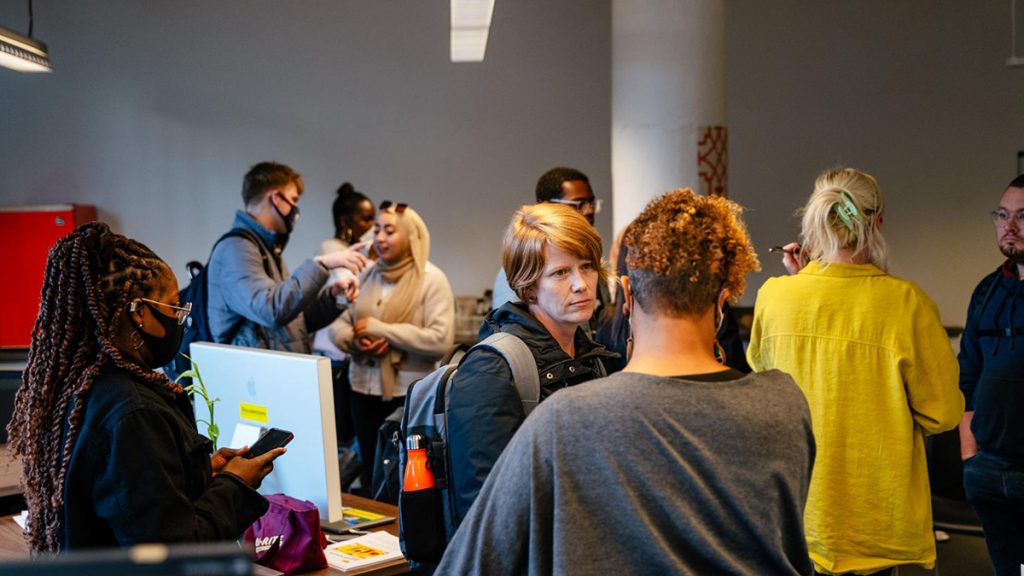
The Outlier Media newsroom welcomed Detroiters in person to hear their input on transit needs and coverage. This kind of effort is an example of the near future contemplated by the Roadmap for Local News. Photo: Nick Hagen
A roadmap for a way out of this mess
Sarah Alvarez is a RJI Columnist whose column explores the challenges, potential solutions and much needed change for journalism. She is also the founder and Editor-in-Chief of Outlier Media, a local newsroom and information service serving Detroiters.
New report helps chart a path away from local news of old toward civic information systems
Today was a pretty typical day in our Detroit newsroom. Reporters worked on stories about the housing commission and the city not hiring for important positions. We also got a text message ready to send to a few thousand Detroiters about how to challenge their property tax assessments. We texted back and forth with a few other people about challenges they’re having, including one man who has had his electricity disconnected for more than a week in freezing temperatures.
I edited a guide we’re working on with another newsroom to help parents access the few transportation options we have to get children to and from school. Then we planned a live, citizen-led fact-checking of an upcoming speech by the mayor. We also sent out one of our weekly newsletters connecting Detroiters to updates on a state minimum wage push and new places to find vegan pizza and Yemeni coffee. We also taught a new batch of Detroit Documenters how to live tweet what happens in city meetings.
Our work is not yet typical of local news. But our approach, to center and respond to Detroiters’ information gaps and address the systemic failures that create harm in our community is exactly the kind of work contemplated by the Roadmap for Local News, written by local news heavyweights Elizabeth Green, Darryl Holliday and Mike Rispoli after months of interviews with dozens of people, including myself, who work in or around local news.
The Roadmap’s framework is a call to “coordinate work around the goal of expanding ‘civic information,’ not saving the news business.”
I couldn’t agree more, even as I think we can all agree that ‘civic information’ as a term is going to need some work. Newsrooms that have already adopted a mantle of civic information providers have been running experiments all over the country and learning together and from each other that we can build demand for our work by responding to community needs rather than chasing an imaginary and corruptible news cycle.
The newsrooms that work this way already are comparatively small and few because support and funding has been hard to come by. I hear one of the calls to action coming from the roadmap as a plea for funders to help more people from all across the country build, launch and sustain projects and jobs building more responsive and healthy civic infrastructure.
Newsrooms that have already adopted a mantle of civic information providers have been running experiments all over the country and learning together and from each other that we can build demand for our work by responding to community needs rather than chasing an imaginary and corruptible news cycle.
To their credit, the authors of the roadmap have asked for and sincerely want feedback. A few obvious questions remain that this report doesn’t need to answer, but those of us in this local work do.
The first is — exactly where is this road map taking us? Sure, it can help us understand what civic information may look like and why it is infinitely more valuable than “content.” But we will be hard-pressed to make this transformation feel possible and compelling without being clear about what we and our communities think the world can look like with healthier information systems in place.
It also remains unclear exactly how the civic information our communities deserve gets paid for. The answer, broadly, is that almost all of it will need to be subsidized at the outset. Some of it will need philanthropic support for the longer term. Some might have to come in the forms of new public funding mechanisms that protect editorial independence. There is no way around this reality because it is hard to make money in the news. Chasing clicks, eyeballs, outrage and dollars is part of what has gotten us into this mess.
The report recommends sharing costs and services to use resources more effectively, something that makes sense even as I share the concern that organizations doing this work need funding more than shared service providers but still have a harder time getting this support from philanthropy.
America is up against monumental challenges right now. A better way to get information. The broken information landscape of our country is as much to blame as a healthier environment has the potential to help us find a better path.
Making it easier for everyone, and especially those who most need it, to find the information they can trust and that equips them to meet their challenges and achieve their own goals cannot fix everything in this country and is not the only thing that needs to change.
Still, I’m not sure we can change much without first fixing our broken local news systems.
